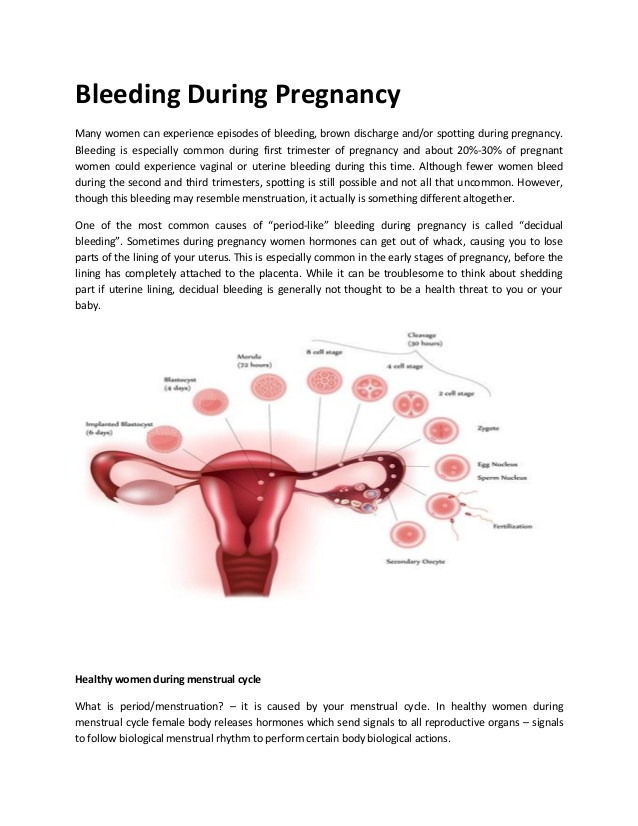Bleeding During Pregnancy

Contents:
- Bleeding During the First Trimester of Pregnanc
- Bleeding During the Second Trimester of Pregnanc
- Bleeding During the Third Trimester of Pregnancy
- Bleeding Reasons in Late Pregnancies
Vaginal Bleeding and Cramping During Pregnancy
Any mother-to-be would like to have her child grow and develop smoothly for all 40 weeks of pregnancy when bearing a child. A woman is often scared to find something threatening to the health of her child when she experiences her bleeding. The bleeding during pregnancy occurs in every fifth woman and in most cases, it is not risky for the healthy pregnancy.
Nevertheless, you should seek a medical help when you experience bleeding when pregnant even if it is not intensive. If it is not possible for whatsoever reason, you’d better visit the nearest clinic or hospital. Note that you’d better stay home and have the doctors home. It is necessary to do even if you notice a few drops of blood in your panties or the toilet paper.
If your discharge is brown, that is something to do with the residual menses. If the bleeding is intensive, like the ordinary periods, during your pregnancy, you’d rather call for the admitting physician or an ambulance to avoid potential collapse of circulation.
Bleeding During the First Trimester of Pregnancy
Bleedings are more often in the first 14 weeks of pregnancy. As such, a doctor performs ultrasonography to check the intactness of placenta and the heart rate of the fetus (it is easily visualized since the 6th week). The cervix is also checked for secure closing.
Reasons for bleeding in early pregnancy:
- Cervix impairment: the most common but yet, the harmless. In early stages the blood intensely supplies the mouth of the womb and it becomes too sensitive. During sex or physical exercises vessels may get affected or ruptured. When this occurs, the bleeding is painless, often mild and transient to disappear in 4 to 6 hours. Treatment: you should care of yourself and postpone physical loads for a couple of days.
- “Menses”: mild blood smears appear on the day of regular periods in about every 50th pregnant woman and this phenomenon is still not explained. These discharges are not threatening and such bleeding disappears in several days.
- Too little progestational hormone: if the ovaries produce insufficient progesterone, the endometrium exfoliates and bleeds the same as during periods (women with the known irregular periods as well as women who undergone the fertility treatment often experience this). The ovum implantation may occur abnormally and the placenta develops slower. It results in the bleeding like the mild menses and in some particular cases it may cause too strong bleeding in the early pregnancy. Treatment: in case of insufficient progesterone (by the blood check results) hormone therapy is recommended using suppositories, tablets or injections, proper care and rest.
- Miscarriage (abortion): a woman has her pregnancy terminated in case of abnormal development of the fetus. One of laws of nature says “All or Nothing”. About 60 % of all early miscarriages (between the 6th and 12th weeks) are supposedly caused by malposition of the fetus due to genetic failures. A woman normally can son fall pregnant and carry a child with no problems. Prior to the miscarriage, a woman experiences pains in her lower abdomen similar to menstrual spasms. She’d better seek for consultation when such disturbing symptoms occur. Such a bleeding in the early stages of pregnancy may become intensive. If tissue cells are discharged, these should be shown to the physician (for example, with the sanitary pad with the discharge on it). Treatment: rest and medicinal sedation of the womb. If the fetus died (which is visualized with the ultrasonography), remainders of placenta and mucous membrane are removed out of the womb the short-term general anesthesia (normally, on an outpatient basis; rare cases require two-day stay at the hospital).
- Fallopian pregnancy: in about one in 100 pregnant women the fertilized ovum moves for implantation not in the uterus but it stuck in the fallopian tube. Reasons: cicatrix and synechias in the uterine tube. The risk of tubal pregnancy increases if a female uses an intrauterine device and given frequent and uncured ovaritis. The higher danger if faced when the fetus grew big enough to rupture the uterine tube (it normally happens on the 7th-9th week of pregnancy). It results in the severe and life-threatening bleeding in the early pregnancy. Symptoms: often unilateral pain in the lower abdomen resembling labor pains and spotting. Treatment: urgent surgery on resection of the ruptured tube, arrest of bleeding, preservation of the sound tube.
Bleeding During the Second Trimester of Pregnancy

Between the 14th and 28th weeks of pregnancy the vaginal bleedings rarely occur. The female body is definitely ready to carry a child. The most common bleeding reasons in this stage include falling or strike in the abdomen. A woman should see the doctor with the abdominal pain, even with no spotting, since it may be caused by the hemorrhage between the uterine wall and placenta. If placenta malfunctions, the fetus is at high risk. Treatment: bed rest.
Bleeding During the Third Trimester of Pregnancy
Bleedings after the 28th week of pregnancy occur in every 20th female and may be dangerous for the health of the pregnant and fetus. It requires Emergency Aid call and prior the first aid a pregnant woman should lie down on her left side (to avoid the large abdominal vein squeezed by the fetus) with her legs slightly upward on the pillow.
Bleeding Reasons in Late Pregnancies
- Placenta malposition: in 1 out of 500 women the placenta is placed at the cervix, either over it (placenta previa), which is normally identified with ultrasonics. Preliminary labors may cause the rupture of the placenta blood vessels resulting in painless and sometimes moderate bleeding during pregnancy. However, it may intensify. Treatment: hospital care, medicinal sedation of uterus and Caesarian in case of strong bleeding.
- Premature placental abruption: it rarely occurs prior to delivery. Consequences: hemorrhage, strong and constant pain in the lower abdomen, hard womb. Bleeding is not strong but this condition is risky to have internal severe bleeding in pregnancy and the danger of vessel collapse. Treatment: most often it requires Caesarian section.
At the 6th week I had little spotting in the morning, but I didn’t pay much attention to it. At night I start bleeding, happily I managed to keep the baby.